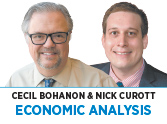Subscriber Benefit
As a subscriber you can listen to articles at work, in the car, or while you work out. Subscribe Now Two words of advice about economics: Incentives matter.
Two words of advice about economics: Incentives matter.
Part of economists’ useful function is to offer alternative ways of structuring incentives to attain socially desired ends.
Deaths from traffic accidents are a tragedy that have elicited several policy responses. One is the federal mandate to install air bags in vehicles. If a crash occurs, drivers and passengers will be less likely to suffer death or serious injury because the air bag cushions the blow.
Well and good, but the economic mind immediately drifts to other considerations. Is it possible that, because a driver perceives she is safer with an air bag, she will not be as careful in her driving? Ball State University colleague Todd Nesbitt and Citadel economist Russ Sobel have shown, using NASCAR data, that increased safety features in race cars almost certainly generated an increase in NASCAR accidents. They also noted that, while the accident rate in NASCAR rose, the injury rate fell.
Yes, the incentive effect of increased safety leads to more risk being taken, but no, it is not strong enough to offset the gains in safety from NASCAR vehicle modifications.
The late economist Gordon Tullock was a master of the art of skewering incentives. He had an earth-shattering recommendation related to traffic safety. If the goal is to reduce traffic deaths and injuries, he argued, air bags are not the most effective way of accomplishing the goal. He proposed the federal government mandate all steering wheels be equipped with protruding spears designed to impale and instantly kill a driver in a crash.
If motor vehicles were designed to be instant death traps upon crash, we suspect that drivers would be very, very careful operators. An alternative proposal that accomplishes the same end is to enact and strictly enforce a national speed limit of 10 miles an hour.
While we suspect both recommendations would reduce traffic fatalities, no jurisdiction will ever enact Tullock’s proposal nor a 10-mile-an-hour speed limit—and rightfully so. If motor vehicle speeds were reduced to a snail’s pace, most of the reason for driving motor vehicles would disappear.
Economic thinking leads us to understand that we are, indeed, willing to take some risks. Let’s face it, driving 70 mph is inherently risky—but it’s worth the risk to attain other ends. In economic terms, a cure can be worse than the disease. Incentives matter—but they can also be delightfully perverse.•
__________
Bohanon and Curott are professors of economics at Ball State University. Send comments to [email protected]
Please enable JavaScript to view this content.
